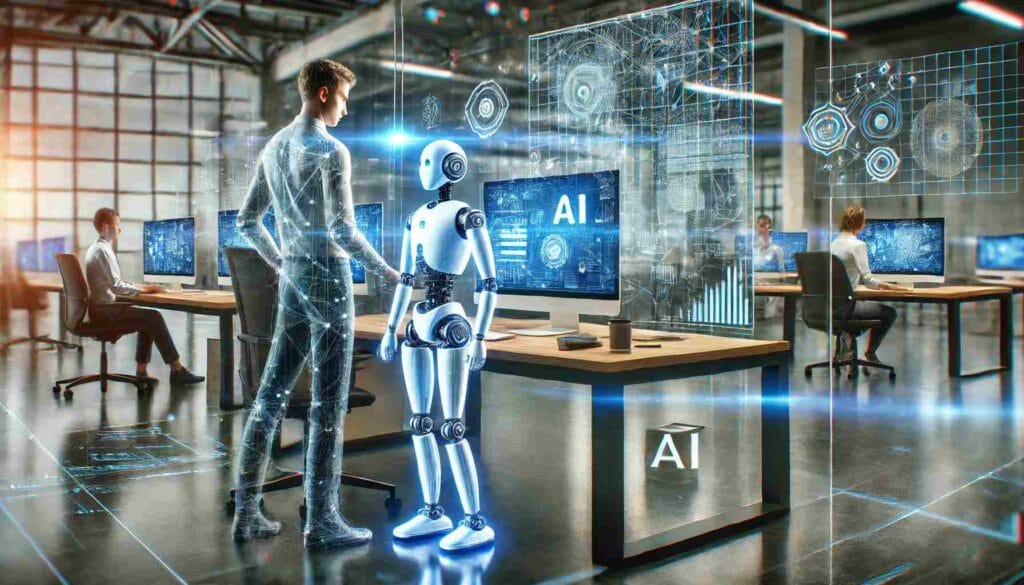The Future of Jobs: Adapting Skills for an AI-Driven World

As we stand on the cusp of the Fourth Industrial Revolution, the rapid advancement of Artificial Intelligence (AI) and automation is reshaping the global workforce. The question of how AI will impact jobs has become a critical one for both workers and businesses alike. While AI promises increased efficiency and innovation, it also presents challenges for workers who may face job displacement and the need for new skill sets. The future of work will require individuals to adapt and evolve in order to thrive in an AI-driven world.
1. AI’s Impact on Jobs: Automation and Transformation
AI and automation technologies have already begun to transform industries by replacing or augmenting certain tasks traditionally performed by humans. In sectors like manufacturing, transportation, and logistics, robots and automated systems are taking over repetitive and manual tasks. This trend is likely to continue, especially in jobs that involve routine or predictable work. For example, autonomous vehicles may replace truck drivers, while AI-powered systems may take over data entry or customer service roles.
However, AI is not only about job displacement. It also has the potential to create new opportunities. Jobs that were previously unimaginable, such as AI specialists, data scientists, and automation engineers, are now in high demand. Moreover, AI can augment human capabilities, allowing workers to focus on more complex, creative, and strategic tasks. Therefore, while some jobs will be lost, others will be created, often requiring workers to adapt and acquire new skills.
2. The Skills of the Future: What Will Be In Demand?
As AI continues to evolve, certain skills will become more valuable than ever. Here are some key competencies that will be essential for the workforce of tomorrow:
- Technical Skills: Understanding how AI works and the ability to interact with and implement AI technologies will be crucial. Skills in machine learning, data science, coding, and robotics will be highly sought after across various industries.
- Creative and Critical Thinking: While AI can handle many tasks, it lacks the creativity and problem-solving abilities that humans possess. Jobs requiring innovation, design thinking, and complex decision-making will remain in demand. Workers will need to develop their critical thinking abilities to complement AI’s capabilities.
- Emotional Intelligence and Soft Skills: As automation takes over technical tasks, human interaction will become even more critical. Skills such as empathy, leadership, communication, and collaboration will continue to be essential in roles that involve direct interaction with clients, colleagues, and customers.
- Adaptability and Lifelong Learning: The ability to learn new skills quickly and adapt to changes in technology will be essential. As AI evolves, workers must continuously update their knowledge and be open to reskilling throughout their careers.
3. The Role of Education and Training
To equip the workforce with the necessary skills for an AI-driven future, education systems must undergo significant transformation. Traditional models of education, which have focused primarily on theoretical knowledge, will need to adapt to include more practical, hands-on learning. This can involve the integration of AI-focused courses into curriculums and fostering a culture of continuous learning.
Governments, businesses, and educational institutions should collaborate to provide training and reskilling programs for workers, especially those whose jobs are most at risk from automation. Reskilling initiatives should focus not only on technical skills but also on developing the soft skills and emotional intelligence needed for the future workforce.
4. The Role of Businesses in Preparing for the Future
Businesses also have a responsibility to prepare for the future of work by investing in their employees. By fostering a culture of innovation and lifelong learning, companies can help workers transition into new roles and adapt to technological changes. In addition, businesses should prioritize diversity and inclusion to ensure that the benefits of AI are accessible to all individuals, regardless of their background.
Moreover, as AI systems begin to take over more routine tasks, businesses should look for ways to harness the potential of AI to augment human workers rather than replace them. This collaborative approach can lead to greater productivity and innovation, as humans and AI work together to solve complex challenges.
5. Conclusion: Embracing the AI-Driven Future
The future of jobs in an AI-driven world is one of both challenge and opportunity. While automation may lead to job displacement, it also opens the door to new possibilities for those who are willing to adapt and learn new skills. By focusing on technical expertise, creativity, emotional intelligence, and adaptability, workers can position themselves to thrive in the changing landscape of work.
As we move forward, education systems, businesses, and governments must work together to ensure that individuals are equipped with the tools they need to succeed in an AI-driven economy. By embracing change and fostering continuous learning, we can build a future where humans and AI coexist, leading to greater innovation, productivity, and prosperity for all.
Source : Medium.com




